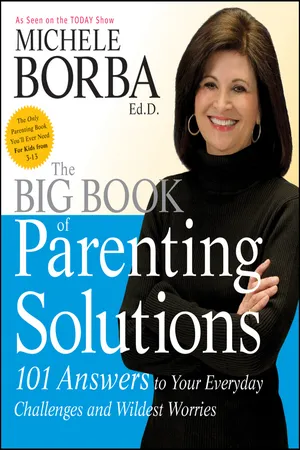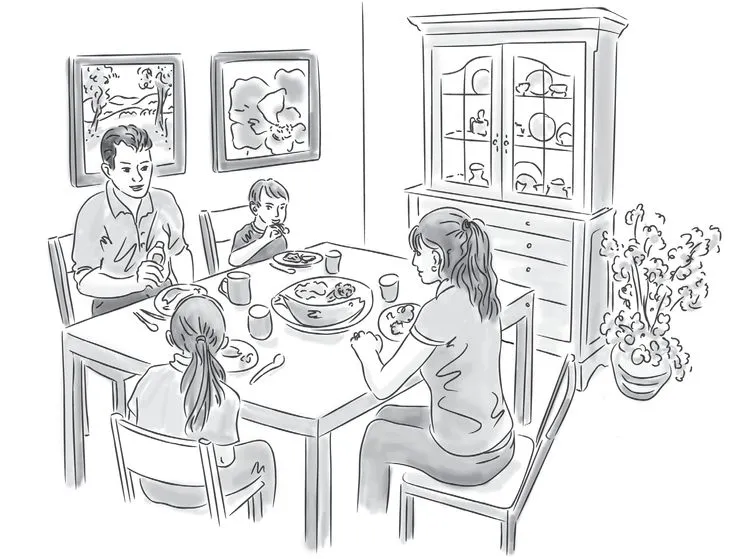
eBook - ePub
The Big Book of Parenting Solutions
101 Answers to Your Everyday Challenges and Wildest Worries
Michele Borba
This is a test
- English
- ePUB (disponibile sull'app)
- Disponibile su iOS e Android
eBook - ePub
The Big Book of Parenting Solutions
101 Answers to Your Everyday Challenges and Wildest Worries
Michele Borba
Dettagli del libro
Anteprima del libro
Indice dei contenuti
Citazioni
Informazioni sul libro
Today show's Michele Borba's cures for difficult childhood behaviors
In this down-to-earth guide, parenting expert Michele Borba offers advice for dealing with children's difficult behavior and hot button issues including biting, temper tantrums, cheating, bad friends, inappropriate clothing, sex, drugs, peer pressure, and much more. Written for parents of kids age 3-13, this book offers easy-to-implement advice for the most important challenges parents face with kids from toddlers to tweens.
- Includes immediate solutions to the most common childhood problems and challenges
- Written by Today Show's resident parenting expert Michele Borba
- Offers clear step-by-step guidance for solving difficult childhood behaviors and family conflicts
- Contains a wealth of advice that is easy-to-follow and gets quick results
- Author has written outstanding parenting books including Building Moral Intelligence, No More Misbehavin', Don't Give Me that Attitude, and more
Each of the 101 issues includes clear questions, specific step-by-step solutions, and advice that is age appropriate.
Domande frequenti
Come faccio ad annullare l'abbonamento?
È semplicissimo: basta accedere alla sezione Account nelle Impostazioni e cliccare su "Annulla abbonamento". Dopo la cancellazione, l'abbonamento rimarrà attivo per il periodo rimanente già pagato. Per maggiori informazioni, clicca qui
È possibile scaricare libri? Se sì, come?
Al momento è possibile scaricare tramite l'app tutti i nostri libri ePub mobile-friendly. Anche la maggior parte dei nostri PDF è scaricabile e stiamo lavorando per rendere disponibile quanto prima il download di tutti gli altri file. Per maggiori informazioni, clicca qui
Che differenza c'è tra i piani?
Entrambi i piani ti danno accesso illimitato alla libreria e a tutte le funzionalità di Perlego. Le uniche differenze sono il prezzo e il periodo di abbonamento: con il piano annuale risparmierai circa il 30% rispetto a 12 rate con quello mensile.
Cos'è Perlego?
Perlego è un servizio di abbonamento a testi accademici, che ti permette di accedere a un'intera libreria online a un prezzo inferiore rispetto a quello che pagheresti per acquistare un singolo libro al mese. Con oltre 1 milione di testi suddivisi in più di 1.000 categorie, troverai sicuramente ciò che fa per te! Per maggiori informazioni, clicca qui.
Perlego supporta la sintesi vocale?
Cerca l'icona Sintesi vocale nel prossimo libro che leggerai per verificare se è possibile riprodurre l'audio. Questo strumento permette di leggere il testo a voce alta, evidenziandolo man mano che la lettura procede. Puoi aumentare o diminuire la velocità della sintesi vocale, oppure sospendere la riproduzione. Per maggiori informazioni, clicca qui.
The Big Book of Parenting Solutions è disponibile online in formato PDF/ePub?
Sì, puoi accedere a The Big Book of Parenting Solutions di Michele Borba in formato PDF e/o ePub. Scopri oltre 1 milione di libri disponibili nel nostro catalogo.
Informazioni
Editore
Jossey-BassAnno
2009ISBN
9780470488102
Edizione
1Part 1
Family
OUT OF THE MOUTHS OF BABES
WHY GOD MADE MOMS
WHY GOD MADE MOMS
Answers given by second-grade schoolchildren to the following question:
Why did God make mothers?
Why did God make mothers?
1. She’s the only one who knows where the scotch tape is.
2. Mostly to clean the house.
3. To help us out of there when we were getting born.

Adopted
SEE ALSO: Angry, Communicating, Depressed, Fearful, Grief, Homesick, Stressed
THE PROBLEM
Red Flags
Feelings of loss or abandonment by the birth parent, shame and humiliation about unknown origins of birth and early life, emptiness; inadequate sense of identification with adopted family, extended family, and community; feelings of competition and of always being a loser with any natural birth siblings or extended family kids; fears of being thrown out and abandoned by adopted family
The Change to Parent For
Your adopted child feels secure, loved, and attached to his new family. He may ultimately be curious about his birth family, but he remains connected to his adopted family as well.
Why Change?
Each year some 120,000 children are adopted in the United States. Recently about 40,000 children in one hundred countries have replaced domestic adoptions due to a shortage of local adoptees. The latest news shows that the vast majority of adopted children are doing just fine, thank you. One big reason is that adopting parents are a special breed. Research finds that most are highly motivated, better educated, and better off financially than parents who do not adopt. They are also more likely to get help from mental health professionals for their adopted child when behavioral problems arise.1 But there are unique challenges in parenting an adopted child. The most serious of those issues have nothing to do with when the child comes into your home but rather what happened before his adoption. Genetic factors, the health and habits of the biological parents, and any trauma the child may have experienced can affect mental health. That’s why the more knowledgeable you are, the better prepared you’ll be in making the right decisions for your child. Although not born of your flesh, this child is definitely born of your labor of love.

LATE-BREAKING NEWS
Minneapolis: One of the largest studies of adoption, “Growing Up Adopted,” was conducted by the Search Institute.2 The study included more than 880 adolescents who were adopted as infants, and found that most developed psychological well-being that was about equal to that of twelve- to eighteen-year-olds who were not adopted. What’s more, 55 percent of the adopted teens reported high self-esteem and self-understanding compared with 45 percent of the nonadopted teens. Their acceptance of their adoption was reflected in their response to the question, “Which of the four different ways young people might feel about adopted is most like you?”
• “Being adopted has always been easy for me”: 68 percent
• “Being adopted used to be hard for me, but now it’s easier”: 15 percent
• “Being adopted used to be easier for me, but now it’s harder”: 12 percent
• “Being adopted has always been hard for me”: 5 percent
This research should put your mind a bit more at ease if you’ve ever had that gnawing concern as to how adoptees turn out.
THE SOLUTION
Seven Strategies for Change
1. Know the law. The process of adoption can be difficult and confusing at best, so it’s critical that you become knowledgeable about laws and regulations to prevent any heartache down the road. Some determined parents who want to adopt kids bump into obstacles and then try to ignore or circumvent domestic and international laws. Those laws will vary depending on the original place of birth; the sex, health, and age of the child; and whether you are pursuing a public agency adoption, foster care adoption, independent adoption, or international adoption. Gather as much information as you can about laws, regulations, guidelines, required training, documentation interviews, home visits, the time frame for the process, and the cost. For information, seek out the National Council for Adoption.
2. Gather as much history as possible. The more you know about your child’s past history, the better you’ll be able to handle potential behavior, education, or medical problems. Try to find out these details, with the understanding that data may be sketchy or lost:
Child’s history. Instances of early trauma or child abuse; contacts for all previous placements; an older adopted child’s social, developmental, medical, behavioral, psychological, and educational history.
Previous placements. Foster parents and sibling names and addresses; an older child’s temperament, interests, activities, concerns, and fears, as well as what soothes him and helps him cope. Ask questions of every agency and demand as much data from previous homes as you can access.
Birth parents. Medical information: alcohol, drug addiction, sexually transmitted diseases, possible genetic liabilities, or lack of prenatal care; cultural, religious, medical, genetic, and social background or anything else that you think your child may one day want to know.
3. Talk about adoption from the beginning. The general thinking is that parents should tell their child about his adoption early on. Here are a few principles to use in talking to kids about adoption.
• Start early. Begin using the term “adoption” during your child’s early toddler and preschool years to help you feel at ease. Just look for natural ways to bring up the topic, such as mentioning a friend who is considering adoption, or a book, TV show, or movie about adoption. Your child always needs to hear this information from you in a context of approval, love, and commitment.
• Create an open-door policy. Peter L. Benson, lead researcher of one of the largest studies on adoptees, says that “Quiet, open communication about adoption between adopted kids and their parents seems to be the key” to helping kids thrive and take their adoption in stride.3 Your child needs to know he can come to you in ease and comfort with any question and at any time.
• Be honest. Never hide the fact that your child is adopted or cover up the tougher parts about your child’s “past life.” Doing so can create serious trust issues between you and your child when the truth comes out later.
• Stick to what has been asked. Although you should be honest, only give your child what he needs to know at the time. Too much information is overwhelming. Leaving out certain facts due to the age of your child is okay. Use words and language that are suitable to your child’s age and ability to understand.
• Use literature. Books are a great way to discuss adoption with your child. Here are a few tailored to different ages.
Preschooler: Tell Me Again About the Night I Was Born, by Jamie Lee Curtis; The Day We Met You, by Phoebe Koehler
School age: A Place in My Heart, by Mary Grossnickle; How Families Are Made and How Kids Feel About It, by Marc Nemiroff and Jane Annunziata; My Adopted Child, by Kevin Leman and Kevin Leman II
Tween: It Happened to Me: Adopted: The Ultimate Teen Guide, by Suzanne Buckingham Slade; Today I Was Adopted, by Yvonne Drew; All About Adoption: How It Feels to Be Adopted, by Jill Krementz; Maybe Days: A Book for Children in Foster Care, by Jennifer Wilgocki and Marcia Kahn Wright
• Be reassuring. The central fear of adopted children is that they will be “given up” again. Your child needs assurance—both now and forever—that your relationship is permanent. Reassure your child that his feelings (whatever they may be) and quest for information about his past are normal and that you will do whatever you can to fill in those details.
• Keep an ongoing dialogue. Kids grasp the concept of adoption in gradual stages over time. Be prepared to repeat an explanation as your child’s understanding evolves. Be patient and answer what he asks each and every time as though your child has asked for the first time. Most teens who have adjusted to their adopted status say they report two or fewer conversations about their adoption with either parent in the past year, but feel comfortable talking with parents about such issues.4
4. Watch for attachment problems. Strong emotional bonds between child and parent are crucial for healthy psychological development, but especially for adoptees. Early adoption (at least before the age of six months) is usually easiest.5 Your child may have been exposed to trauma during his early years that could curtail healthy attachment. New studies reveal how early infant-caregiver interactions affect brain development and a child’s future neurological, physical, emotional, behavioral, cognitive, and social development. Familiarize yourself with the work of Daniel Siegel, Stanley Greenspan, Daniel Stern, or Bruce Perry; read Ghosts from the Nursery, by Robin Karr-Morse and Meredith S. Wiley; contact the adoption agency for information; or seek out the Association for the Treatment and Training in the Attachment of Children (ATTACh.org). If you have any problems bonding, get help immediately. You will need highly specialized and proven advice so that you can provide the best help for your child.
5. Keep some things secret. Painful details about your child’s past (such as sexual and physical abuse, a parent’s criminal background, the birth mother’s alcoholism or drug addiction, or that the pregnancy was caused by rape) should be kept confidential. Besides you and your parenting partner, only the child’s doctor or mental health professional needs to know those details for now. If anyone asks, simply say, “When Devon is old enough, he can choose to share about his past. We have all the information we need.” Then say no more and protect your child. You also do not need to address those issues with your child until he is old enough to understand. A few resources to help you prepare for discussion of more difficult topics with adoptees are Making Sense of Adoption, by Lois Ruskai Melina; Great Answers to Difficult Questions About Adoption: What Children Need to Know, by Fanny Cohen Herlem; and Telling the Truth to Your Adopted or Foster Child, by Betsy Keefer and Jayne E. Schooler.
6. Make it normal! All kids have the same basic needs: to feel safe, loved, and accepted. The last thing they want is to feel “different.” So never introduce your child as anything other than a member of your family. Don’t say “He’s our adopted child” or “He’s from China,” regardless of how different he looks from you or his siblings. I’d also caution against your using such terms as “our chosen child” or “the special one” as well. The terms may make your child feel as though he stands apart from your family or that he always has to somehow measure up to your expectations.
7. Help your child work through emotional issues. Your adopted child may feel abandoned because a birth parent gave him up, angry at the parent who deserted him, or responsible for what he perceives as causing past pain, though it probably was not the case. Those negative feelings might materialize any time (often at the anniversary of the adoption or at other significant events) despite all your love and effective parenting. Know that your child will ultimately ask about his birth parents at some point. One study found that 70 percent of adopted girl teens and 57 percent of adopted boys admit that they’d like to meet their birth parents (though the majority said they “seldom or never wished to actually live with their birth parents”).6 Don’t take your child’s desire per...
Indice dei contenuti
- Praise
- Title Page
- Copyright Page
- Dedication
- Note to the Reader
- Acknowledgements
- Introduction
- The Parents Magazine “Joys of Motherhood Survey”
- Part 1 - Family
- Part 2 - Behavior
- Part 3 - Character
- Part 4 - Emotions
- Part 5 - Social Scene
- Part 6 - School
- Part 7 - Special Needs
- Part 8 - Day to Day
- Part 9 - Electronics
- Notes
- About the Author
- Index
Stili delle citazioni per The Big Book of Parenting Solutions
APA 6 Citation
Borba, M. (2009). The Big Book of Parenting Solutions (1st ed.). Wiley. Retrieved from https://www.perlego.com/book/1009413/the-big-book-of-parenting-solutions-101-answers-to-your-everyday-challenges-and-wildest-worries-pdf (Original work published 2009)
Chicago Citation
Borba, Michele. (2009) 2009. The Big Book of Parenting Solutions. 1st ed. Wiley. https://www.perlego.com/book/1009413/the-big-book-of-parenting-solutions-101-answers-to-your-everyday-challenges-and-wildest-worries-pdf.
Harvard Citation
Borba, M. (2009) The Big Book of Parenting Solutions. 1st edn. Wiley. Available at: https://www.perlego.com/book/1009413/the-big-book-of-parenting-solutions-101-answers-to-your-everyday-challenges-and-wildest-worries-pdf (Accessed: 14 October 2022).
MLA 7 Citation
Borba, Michele. The Big Book of Parenting Solutions. 1st ed. Wiley, 2009. Web. 14 Oct. 2022.